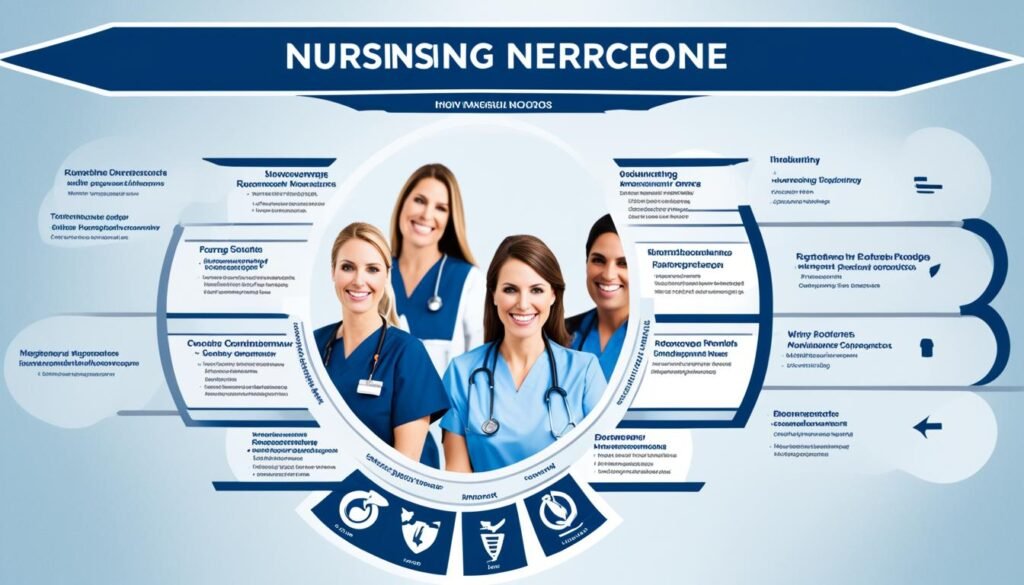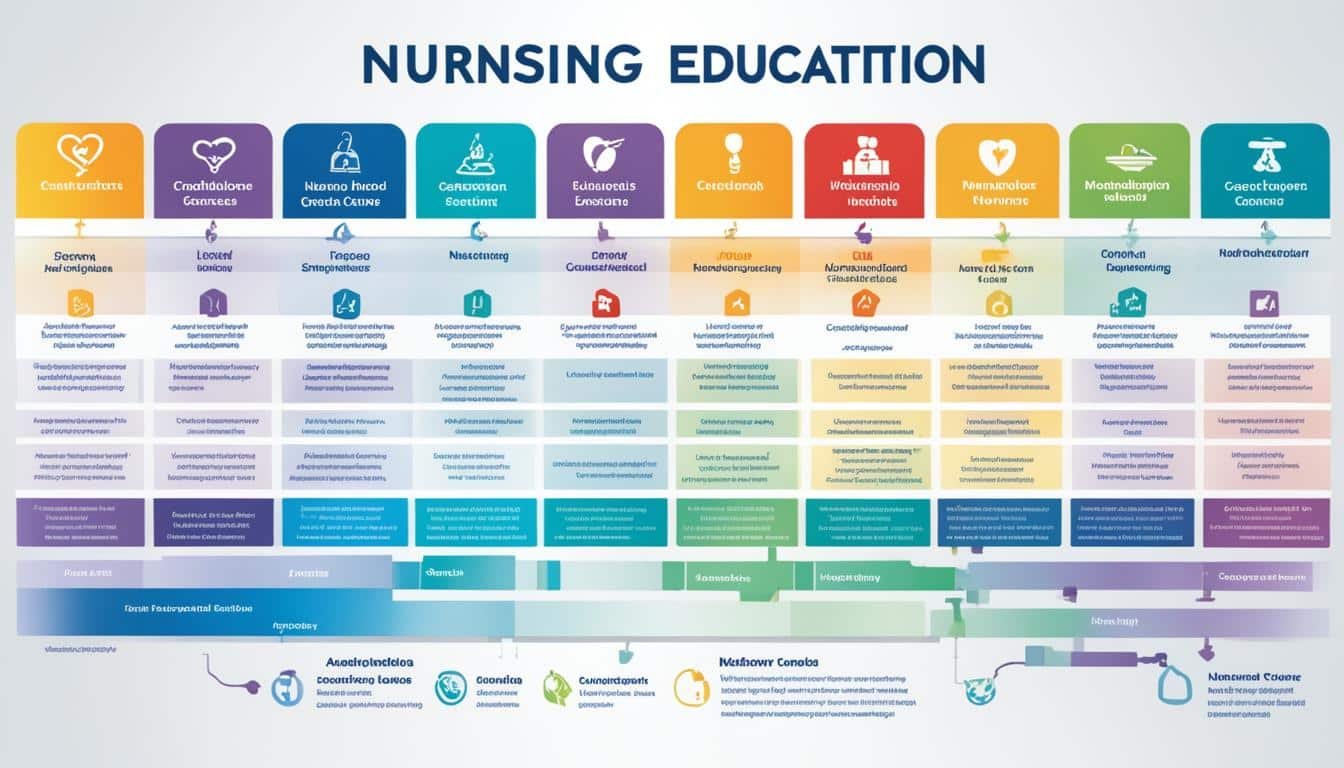Nursing is a dynamic field with various career options. It starts from basic certifications to high-level degrees. You get a chance to learn about different nursing education levels, their roles, and what they earn. This detailed look will help you understand the many paths in nursing.
Also Read: What Career Pathways Are Available Through Career And Technical Education?
Key Takeaways
- Nursing education spans from entry-level certifications to advanced practice degrees, each with its own set of requirements and responsibilities.
- Certified Nursing Assistants (CNAs) provide basic patient care. Licensed Practical/Vocational Nurses (LPNs/LVNs) handle more specialized tasks.
- Registered Nurses (RNs) play a vital role and can get an Associate’s or Bachelor’s degree.
- Advanced Practice Registered Nurses (APRNs), like Nurse Practitioners or Clinical Nurse Specialists, have higher degrees and more patient care duties.
- Nurses can also specialize in areas like Pediatrics or Oncology. This opens more career options across all levels of education.
Introduction to Nursing Education Levels
Nursing offers various paths to specialized roles, ranging from non-degree to advanced degrees. This piece will walk you through the nursing levels and their specific duties and job opportunities. Knowing your nursing education options is key for anyone looking to start or progress in nursing.
Also Read: LEED Exam Accreditation: Career Benefits And Opportunities
The nursing education structure includes many programs with different demands and tasks. You can start in basic positions and then move up to specialized, high-level roles. So, there are lots of choices for those aiming to help in the healthcare sector.
Now, let’s dive into nursing education’s many levels. We’ll start with the basics, moving up to advanced degrees. These degrees lead to specialized jobs and chances for leadership in nursing.
There are many ways to begin a nursing career, thanks to the varied education paths. By learning about each level and its roles, you can choose the right nursing career journey. It’s a fulfilling field with lots of chances to grow and lead in healthcare.
Certified Nursing Assistant (CNA)

Certified nursing assistants (CNAs) are crucial in healthcare. They care for patients. CNAs work in homes and facilities, helping with daily tasks like bathing and eating. They are the main link between patients and the medical team, offering both care and comfort.
Also Read: CBEST Exam Registration: A Step By Step Guide
Position Description
The main job of a CNA is to:
- Help patients with daily personal tasks like grooming and dressing
- Aid patients in moving and walking as needed
- Watch over vital signs and track their food and drink intake
- Notify the nursing team of any patient condition changes
- Emotionally support and interact with patients
Requirements
To become a CNA, you usually need a high school diploma or GED. Then, complete a state-approved program, which lasts 3 to 8 weeks. The program includes classroom learning, lab practice, and real-world experience. After this, you must pass a state exam to get your CNA certification.
Salary and Job Outlook
In 2019, the median salary for CNAs was $29,640. Jobs for CNAs are expected to grow quickly, with an 8% or more increase from 2019 to 2029. This growth would lead to about 119,500 new positions during that time.
| Metric | Value |
|---|---|
| Median Annual Salary (2019) | $29,640 |
| Job Growth Rate (2019-2029) | 8% or higher |
| Estimated New Job Openings (2019-2029) | 119,500 |
“Certified nursing assistants play a vital role in providing compassionate, hands-on care to patients in a variety of healthcare settings.”
Also Read: How To Register For The CLEP Exam: A Complete Guide
Licensed Practical Nurse (LPN)/Licensed Vocational Nurse (LVN)

LPNs/LVNs are key to healthcare, giving direct patient care. They look after patients’ health and talk with the healthcare team. LPNs/LVNs help with important care tasks like checking vital signs and changing bandages.
Position Description
Under the watch of RNs and doctors, LPNs/LVNs help with patient care. They give out medicines, take samples for tests, and keep patient records. Often, they work in places such as long-term care homes, hospitals, and clinics.
Requirements
Getting into LPN or LVN work requires finishing a Practical Nursing Program. This is faster than a bachelor’s because it only takes up to a year to complete. After the program, there’s a test called the NCLEX-PN to get a state license.
Salary and Job Outlook
In 2019, LPNs/LVNs made a median salary of $47,480. The job market looks good with an expected job growth of 9% or more from 2019 to 2029. This means there will be a lot of new job opportunities. The need for their services is growing a lot, especially in places like long-term care and home healthcare.
Also Read: What Is The PSAT Exam And Why Is It Important?
“LPNs/LVNs play a crucial role in the healthcare system, providing direct patient care and supporting the work of registered nurses and physicians.”
Registered Nurse (RN)

Registered nurses (RNs) are key in healthcare, managing many tasks. They give medicine, help plan patient care, and work closely with doctors. RNs also lead certified nursing assistants (CNAs) and licensed practical/vocational nurses (LPNs/LVNs).
They have various roles like in cardiac care, case management, and as flight nurses. To become an RN, you need to finish an Associate Degree in Nursing (ADN) or a Bachelor of Science in Nursing (BSN) program.
Associate Degree in Nursing (ADN)
Completing an Associate of Science in Nursing (ASN) or an ADN program takes two years. These are available at community colleges. After this, students must pass the NCLEX-RN exam to get their RN license.
Bachelor of Science in Nursing (BSN)
Earning a BSN takes four years. You can study for it at universities and colleges. Though ADN and BSN graduates can both get RN licenses, a BSN is often seen better by employers.
It is also connected with improved patient care. A few states are making it a must for RNs to earn a BSN by a certain time.
| Degree | Program Length | Licensing Exam | Employer Preference |
|---|---|---|---|
| ADN | 2 years | NCLEX-RN | Can become RN, but BSN preferred |
| BSN | 4 years | NCLEX-RN | Often preferred by employers, linked to better patient outcomes |
Nursing Education – Advanced Practice Registered Nurse (APRN)

Advanced practice registered nurses (APRNs) are leaders in patient care. They move beyond just following a care plan. This group includes nurse practitioners, nurse anesthetists, nurse midwives, and clinical nurse specialists.
Position Description
APRNs offer advanced nursing care. They can work in many settings like hospitals, clinics, or with a private doctor. Most APRNs choose a field to specialize in, like working with families, kids, or the elderly.
Requirements
For APRN, you need to be an RN and have at least a year of experience. After that, getting a Master of Science in Nursing (MSN) degree and passing a national exam are a must.
- Hold an RN license
- Have at least one year of RN experience
- Earn an MSN degree
- Pass a certification exam
Salary and Job Outlook
APRNs made a median of $115,800 a year in 2019. Job prospects look great, with a 45% growth from 2019 to 2029. This growth might bring 117,700 new jobs.
| Metric | Value |
|---|---|
| Median Annual Salary (2019) | $115,800 |
| Job Growth Projection (2019-2029) | 45% |
| Estimated New Job Openings (2019-2029) | 117,700 |
The increase in jobs for APRNs is because more people need their services. This is especially true for primary care, handling chronic diseases, and specialized care.
Master of Science in Nursing (MSN)

A Master of Science in Nursing (MSN) is a step higher than a bachelor’s, preparing nurses for more advanced roles. This includes being a nurse practitioner, nurse anesthetist, nurse midwife, or clinical nurse specialist. For those with a Bachelor of Science in Nursing (BSN), the MSN program can be completed in 1-2 years.
The program builds on what students learned in their bachelor’s. They study things like healthcare policy, using technology in nursing (nursing informatics), and best practices in healthcare. Students can also choose to focus on areas like family care, children’s health, or mental health.
After finishing the MSN, grads are ready for leadership in nursing. They might become nurse practitioners, midwives, or clinical specialists. These nurses are key in primary care, managing long-term health issues, and working closely with other healthcare professionals for the best patient care.
Besides these roles, MSN-prepared nurses can also work in teaching, research, or managing healthcare settings. They help move the nursing field forward and guide new nurses. This widens their impact beyond direct patient care.
“The MSN program gives the skills and knowledge to lead in nursing. It helps nurses make big changes in healthcare and their patients’ lives.”
The Master of Science in Nursing (MSN) opens new doors for nurses. It boosts their career, income, and lets them play a big part in the changing world of healthcare.
Nursing Specialties

Nursing covers many areas, giving professionals chances to find their niche and shine in patient care. Three key areas are pediatric nursing, oncology nursing, and critical care nursing.
Pediatric Nursing
Pediatric nursing involves looking after babies, kids, and teens by developing skills specific for their needs and health challenges. Nurses work in places like hospitals, schools, and clinics. They might focus on areas like caring for new babies or helping cancer patients.
When helping children, nurses need to understand children’s different needs. They must talk well with kids and their families to get the best results. Nurses help keep kids healthy, manage sickness, and support them during tough times.
Oncology Nursing
Oncology nursing is about caring for cancer patients from the start of their treatment. Nurses help with chemotherapy, manage side effects, and support patients emotionally and in many ways. They can focus on types like breast cancer or work with kids who have cancer.
To help cancer patients, nurses must know a lot about cancer treatment. They make sure patients get top care and help them face the challenges ahead.
Critical Care Nursing
Critical care nursing means looking after very sick patients in intense care units or trauma centers. Nurses work closely with doctors and teams to care for patients, give medicine, and make quick choices. They can focus on areas like helping kids in intensive care or burn patients.
Working in critical care, nurses have to be very good at their job. They monitor patients closely and react fast to changes. In these fast, high-pressure places, their skills and teamwork can save lives.
| Nursing Specialty | Focus | Work Settings | Potential Specializations |
|---|---|---|---|
| Pediatric Nursing | Caring for infants, children, and adolescents | Hospitals, pediatric clinics, schools, specialty care units | Neonatal nursing, pediatric oncology |
| Oncology Nursing | Caring for patients with cancer | Hospitals, cancer treatment centers, specialty clinics | Breast cancer, pediatric oncology, radiation oncology, surgical oncology |
| Critical Care Nursing | Caring for critically ill patients | Intensive care units, trauma centers | Trauma nursing, pediatric ICU nursing, burn ICU nursing |
Pediatric, oncology, and critical care nursing give chances to help in special ways. Nurses, with their focused skills and knowledge, can truly change lives and improve healthcare for their patients.
Advanced Practice Nursing Roles

In the wide world of nursing, there are key advanced roles. These roles bring special skills and more duties. They include the Clinical Nurse Specialist (CNS), the Nurse Practitioner (NP), and the Certified Registered Nurse Anesthetist (CRNA).
Clinical Nurse Specialist (CNS)
Clinical Nurse Specialists are at an advanced level. They lead and use their deep clinical knowledge to help patients. They are found in hospitals, clinics, and other care facilities. CNSs pick a patient group or clinical area to focus on. They take care of patients, do research, teach other nurses, and help shape healthcare policies.
Nurse Practitioner (NP)
Nurse Practitioners stand out as they have advanced degrees. They can do more medical tasks for patients. NPs diagnose and treat illnesses, write prescriptions, and order tests. They often work with families, kids, the elderly, or with mental health issues. NPs have more freedom in how they practice, especially in states where laws are supportive.
Certified Registered Nurse Anesthetist (CRNA)
Certified Registered Nurse Anesthetists (CRNAs) are key in surgery and other medical procedures. They provide anesthesia. CRNAs work closely with the surgical team to ensure patients are safe and comfortable during their procedures.
These advanced nursing roles are vital in providing specialized care. They also push the nursing field forward by leading in innovations.
Also Read: The Secret Advantages Of University Scholarships
Conclusion
Nursing offers many paths to learn and grow, from starting as a nursing assistant to becoming a top-level nurse. Each step prepares someone for different duties and chances in healthcare. Knowing about these levels helps people choose the right way for their nursing dreams.
Every nurse, no matter their education, brings care and support to patients and communities. They help with daily tasks, give medicines, or lead health teams. Nursing lets people change lives for the better, making a real difference.
The need for skilled nurses keeps rising as healthcare changes. Understanding the education levels in nursing helps new nurses feel more secure and find their place. This way, they can follow a path that matches their talents, interests, and goals.
FAQs
What are the different levels of nursing education?
Nursing education levels start with a certified nursing assistant (CNA). Next is the licensed practical nurse/licensed vocational nurse (LPN/LVN). Then, you have the registered nurse (RN). At the top are advanced practice registered nurses (APRNs).
What are the responsibilities of a certified nursing assistant (CNA)?
CNAs care for patients in their homes or in long-term care. They help with basics like bathing, dressing, and eating. CNAs are crucial links between patients and their healthcare teams, often offering emotional support.
What are the educational requirements to become a licensed practical nurse (LPN) or licensed vocational nurse (LVN)?
LPNs and LVNs train in a Practical Nursing Program for about a year. This is quicker than earning a degree. After training, they need to pass the NCLEX-PN to get licensed.
What are the different educational pathways to become a registered nurse (RN)?
There are two ways to become an RN. One is through a two-year ASN or ADN program. The other is a four-year BSN program. Both require passing the NCLEX-RN, but a BSN is often favored by employers.
What is the role of an advanced practice registered nurse (APRN)?
APRNs are RNs in advanced roles. They might be nurse practitioners, nurse anesthetists, nurse midwives, or clinical nurse specialists. They are leaders in healthcare, guiding patient care plans.
What are the educational requirements to become an APRN?
To become an APRN, you need to first be an RN with a year of experience. Then, get your MSN. After that, pass a national certification exam.
What is the job outlook for nursing careers?
The demand for nurses is growing fast. From 2019 to 2029, jobs for CNAs will grow by 8%, and for APRNs by 45%. This means many new jobs will open up.
Source Links
- https://online.xavier.edu/understanding-the-different-levels-of-nursing-education-roles-and-specializations/
- https://nursejournal.org/degrees/types-of-nursing-degrees/
- https://www.usa.edu/blog/levels-of-nursing-explained/





